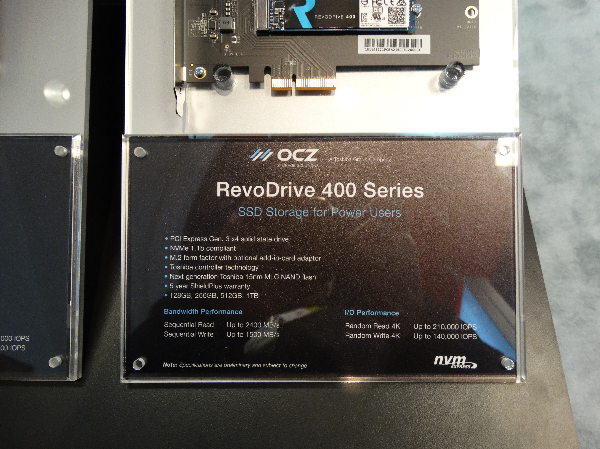Toshiba XG3 M.2 PCIe SSD Review: An OCZ RevoDrive 400 Primer
Toshiba started shipping the XG3 last year, but the SSD remained an OEM secret until now. The XG3 is coming to the retail market as OCZ's RevoDrive 400 in 2016. Today, we look at an OEM XG3 to get a feel for the device's performance.
Why you can trust Tom's Hardware
Conclusion
Toshiba's XG3 is a good OEM storage product that should deliver years of high performance. If you spend the extra money now to get one of these in your notebook (or two in RAID 0, which is how MSI uses them), you shouldn't feel compelled to upgrade anytime soon.
Running out of space is another matter entirely. NAND costs dropped over the last year, and we expect even larger cuts once Toshiba, Micron and SK Hynix roll out their 3D architectures later this year. Toshiba plans to release BiCS 2 after its first generation of 3D didn't pan out as expected. The setback will almost assuredly put Toshiba behind its competition, even though it has the upper hand in 15nm planar NAND. The company can produce more flash per wafer, so its costs are lower.
Vendors that rely on the upgrade market to sell SSDs should be concerned about Toshiba's XG3. Its performance is close to the best drives available today, and most of the systems we've seen with the XG3 are high-end "gaming" notebooks. The folks who buy them are also the ones who drop expensive aftermarket parts into their PCs.
It will be interesting to see what OCZ does with Toshiba's TC58NCP0706SB controller. At CES, we saw a 512GB drive reading sequential data at 2600 MB/s and writing at over 1600 MB/s. That is already higher than the performance OCZ claims. It's also higher than what Samsung achieves with the SM951-NVMe and retail 950 Pro. Neither of Samsung's client-focused drives ships in a 1TB capacity (yet), so OCZ has a serious shot at selling the best M.2 SSD out there. It'll need to launch the drive before Samsung's 48-layer flash sprouts a 950 Pro 1TB.
Even with a 950 Pro on the market, Samsung's V-NAND (3D) is expensive. The new 48-layer flash will increase density per die, but Samsung will not want to get in a price war with Toshiba's 15nm MLC as soon as its new V-NAND emerges. OCZ has a long history of using pricing to overcome minor issues. If the RevoDrive 400 fails to compare to 950 Pro-level performance, then it could be a great value that chisels away at the price of NVMe-enabled SSDs.
MORE: Best SSDs For The Money
MORE: Latest Storage News
MORE: Storage in the Forums
Chris Ramseyer is a Contributing Editor for Tom's Hardware, covering Storage. Follow him on Twitter and Facebook.
Get Tom's Hardware's best news and in-depth reviews, straight to your inbox.
Follow us on Facebook, Google+, RSS, Twitter and YouTube.

Chris Ramseyer was a senior contributing editor for Tom's Hardware. He tested and reviewed consumer storage.
-
toddybody Can't wait till these faster M.2 drives are priced where SATA-SSDs are currently.Reply
I'd love to use M.2 SSDs (250GB-1TB @ ~1400MB/s) for boot/primary drives, and low cost SATA (1-3TB @ ~550MB/s). HDDs can still find value as back up devices with soaring storage sizes for their price. -
Mitchell Marvin Over Christmas i built a new PC around a 6700k and a 980ti but reused a 5 year old 128gb Mushkin SSD, I'm waiting for the right M.2 SSD to catch my eye, and trying not to buy the Samsung one just because its the only one out at the moment.Reply -
Eggz Good information, but the comparison to the XP941 and SM951 seems a little misplaced. Neither of those drives are NVMe SSDs, but this Toshiba-based OCZ drive is. Why not compare with the Samsung 950 Pro instead?Reply -
ssdpro ReplyWhy not compare with the Samsung 950 Pro instead?
You can't make that comparison. The Samsung 950 Pro performance needs to be shown in very specific ways. If you test the 950 Pro using the same methods the 950 Pro would throttle and expose some pretty horrid performance.
-
CRamseyer That is not accurate ssdpro.Reply
I wanted to stay with 128GB capacity class products. The performance increase from 128GB to 256GB is fairly large. I have a 128GB SM951-NVMe on the way but it is not here yet. Samsung didn't release the 950 Pro in this capacity size. -
rantoc ReplyWhy not compare with the Samsung 950 Pro instead?
You can't make that comparison. The Samsung 950 Pro performance needs to be shown in very specific ways. If you test the 950 Pro using the same methods the 950 Pro would throttle and expose some pretty horrid performance.
Agree, got an 950 and just to be sure i placed a heat-sink on its processor and aligned the chassis airflow a little so now it even benchmark consistently. Under normal desktop usage i doubt anyone will ever see the throttling thoo -
Eggz Reply17553728 said:Why not compare with the Samsung 950 Pro instead?
You can't make that comparison. The Samsung 950 Pro performance needs to be shown in very specific ways. If you test the 950 Pro using the same methods the 950 Pro would throttle and expose some pretty horrid performance.
"It gets too warm" isn't a reason to compare dislike hardware. NVMe drives on PCIe should be tested against other NVMe drives on PCIe. A 950 Pro with a heat sync makes for a better comparison than an AHCI drive without one. Don't get me wrong, I think the drives tested would augment the comparative data in a useful way, but it's incomplete without an apples-to-apples comparison. Better to compare hot apples to warm apples than it is to compare cool oranges to warm apples - or you avoid the issue and cool the hot apples until they're warm.
